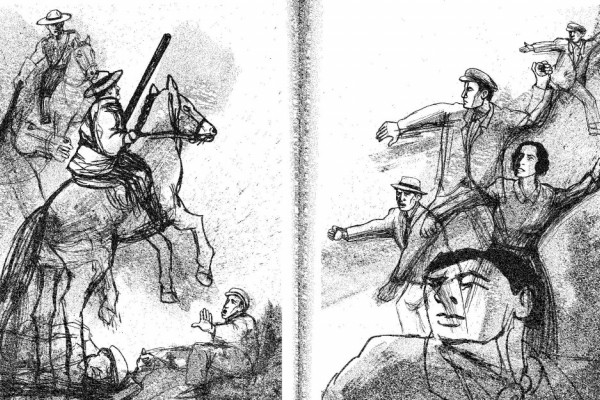Québec Solidaire tightens party discipline with a view to election
Outcome of latest National Council meeting a potential indicator of reluctance by QS to debate important political issues

At Québec Solidaire’s recent National Council meeting, controversy broiled over the leadership’s proposal to censure an organized group within the party, the Collectif antiraciste décolonial. Photo courtesy Québec Solidaire/Twitter.
Québec Solidaire (QS) was born 15 years ago from the unification of the principal left forces in Québec that adopted a common progressive and independentist program. As it grows, having elected 10 Members of the National Assembly in 2018, the party is tempted by the lure of power and a tendency toward the concentration of power internally.
These tendencies were in evidence at the party’s May 15-16 National Council meeting. The controversy that attracted the most media attention was the leadership’s proposal to censure an organized group within the party, the Collectif antiraciste décolonial (CAD), formed in the wake of the debate over QS’s position on Bill 21, the legislation introduced by the Legault government that prohibits people in positions of authority, including teachers, from wearing visible religious symbols. The CAD’s mission is to combat racism and colonialist mentality outside and inside the party.
The party leadership criticized the collective for having approvingly quoted a comment by University of Ottawa professor Amir Attaran to the effect that Québec is the only province that does not recognize systemic racism. Attaran’s comments were widely perceived as another instance of “Québec bashing,” and Parti Québécois leader Paul St-Pierre Plamondon seized on the incident to embarrass QS’s MNAs. QS leaders also criticized the collective for wrongly insinuating some sort of tie between a parliamentary journalist and members of the far right. All of this, in the view of the leadership, justified a vote of censure in order to call the CAD to order.
It was indeed a mistake for the CAD to have aired Attaran’s accusations which gave a very biased and partial view of the situation in Québec. Still, one has to wonder why a left-wing party like QS could not have handled this matter differently. The party’s co-leader, Gabriel Nadeau-Dubois, a skilled orator and by now a seasoned politician, should have set the record straight, putting the blame where it belongs, namely, on the current CAQ government for its indifference to the issue of racial discrimination and for its refusal to recognize the existence of systemic racism in Québec. Indeed, the CAQ exacerbated the problem with its Bill 21 that stigmatizes Muslim women in particular.
And what do QS members think? In the course of its history, the party has demonstrated the decisive influence that its rank and file can bring to bear in internal deliberations when sufficient time is allotted for serious debate. This was the case in 2019, for example, when members took a strong stand against Bill 21. It was also true in 2017, when the membership rejected a proposal backed by influential members of the party leadership to form an alliance with the Parti Québécois.
But this time, the delegates to the National Council meeting, who are elected by the riding associations, were given only three weeks to discuss the motion to censure—too little time to gain a complete understanding of the facts and arguments. Given the paucity of information, apart from what was supplied by the party leadership, the outcome of the discussion was a foregone conclusion. Even so, 29 percent of the delegates voted against the leadership’s position.
There is every reason to believe that the primary motivation behind the leadership’s aggressive position was the approaching 2022 election campaign. The public rebuke of the party’s own Collectif antiraciste decolonial is primarily intended as a message to a segment of the party’s potential voters outside Montréal, where the population is far more homogeneous and anti-racism is not a burning preoccupation, as well as to disappointed PQ voters, who are inclined to be defensive in the face of accusations of systemic racism in Québec.
The motion to censure can also be seen as a signal that the party leadership can control forces that may be perceived as unruly within the party’s ranks. In sum, the CAD, which marches to a different drumbeat, sometimes in a clumsy manner, is perceived as a nuisance and a public relations problem. The outcome of this latest National Council meeting is an indicator of a disquieting reluctance by QS to debate important political issues, which augurs a weakening of internal democratic process.
More than ever, QS members must remain vigilant in face of the threat of electoralism and its corrosive effect on internal democracy if Québec Solidaire is to remain the party of left unity.
Translated and edited with additional content by Andrea Levy.
André Frappier is a regular contributor to CD and a member of the magazine’s coordinating committee. He also serves on the editorial board of the online weekly Presse-toi à gauche and has been a member of the FTQ Montréal Labour Council for many years.










